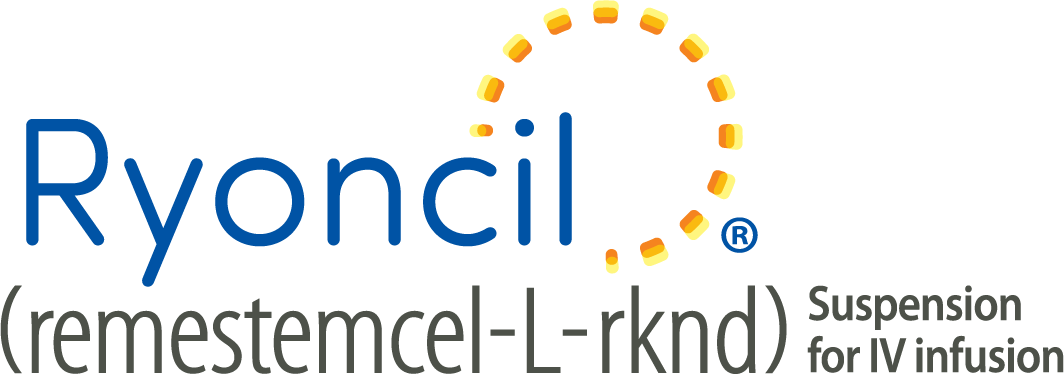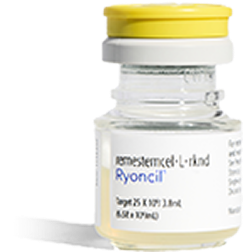INDICATIONS AND USAGE
RYONCIL is indicated for the treatment of steroid-refractory acute graft-versus-host disease
(SR-aGvHD) in pediatric patients 2 months of age and older.
Important Safety Information
Contraindications
Do not use RYONCIL in patients with known hypersensitivity to dimethyl sulfoxide (DMSO) or porcine
and bovine proteins.
WARNINGS AND PRECAUTIONS
Hypersensitivity and Acute Infusion Reactions
Hypersensitivity reactions including acute infusion reactions have occurred with RYONCIL
administration.
Serious hypersensitivity reactions, including anaphylaxis, may occur due to DMSO and trace amounts
of
porcine or bovine proteins. Signs and symptoms may include fever, dyspnea, and hypotension during or
after RYONCIL infusion.
Premedicate patients with antihistamine and corticosteroids and monitor closely for signs and
symptoms of
hypersensitivity or acute infusion reactions.
If a hypersensitivity or infusion reaction occurs, interrupt RYONCIL infusion. Do not administer
RYONCIL
in patients who experience serious or life-threatening reactions.
Transmission of Infectious Agents
Transmission of infectious disease or agents may occur with RYONCIL administration because it
contains
cells from human donors and is manufactured using human, porcine and bovine-derived reagents. Donors
are
screened and tested for Human Immune-deficiency Virus 1 (HIV-1); Human Immune-deficiency Virus 2
(HIV-2); Hepatitis B Virus (HBV); Hepatitis C Virus (HCV); Human T-cell
Leukemia-lymphoma Virus 1
(HTLV-1); Human T-cell Leukemia-lymphoma Virus 2 (HTLV-2); West Nile Virus (WNV); Cytomegalovirus
(CMV);
Epstein-Barr Virus (EBV); and Syphilis (Treponema pallidum). Screening was performed for
Creutzfeldt-Jakob disease (CJD) and communicable disease risks associated with xenotransplantation.
RYONCIL cell banks are tested for human and animal viruses, retroviruses, bacteria, fungi, yeast,
and
mycoplasma. Human and animal-derived reagents are tested for human and animal viruses, bacteria,
fungi,
and mycoplasma before use. These measures do not eliminate the risk of transmitting these or other
infectious diseases or agents.
Ectopic Tissue Formation
Ectopic tissue formation may occur following treatment with RYONCIL due to the ability of human
mesenchymal stromal cells to differentiate into mesenchymal lineage cells such as bone, cartilage
and
fat cells.
ADVERSE REACTIONS
Clinical Trials Experience
Because clinical studies are conducted under widely varying conditions, adverse reaction rates
observed
in the clinical studies of a drug cannot be directly compared to rates in the clinical studies of
another drug and may not reflect the rates observed in practice.
The safety data described in this section reflect exposure to RYONCIL in 54 patients in Study
MSB-GVHD001
for the treatment of SR-aGvHD. Patients received intravenous infusion of RYONCIL at a dosage of 2 x
106
MSCs/kg twice a week for four consecutive weeks, for a total of eight infusions. Patients with
partial
or mixed response at Day 28 received additional infusions of RYONCIL 2 x
106 MSCs/kg once
a
week for an
additional four weeks. The median number of doses administered were 10 (range 1 to 16), and the
treatment was administered over a median of 43 days (range 1 to 104 days).
Serious adverse reactions occurred in 35 patients (65%) including pyrexia (n=5;9%), respiratory
failure
(n=5;9%), pneumatosis intestinalis (n=4;7%) and staphylococcal bacteremia (n=2;<5%). Eight
patients
had discontinuation of RYONCIL treatment due to the following: acute infusion reactions (n=3),
hypotension (n=1), gastroenteritis (n=1), and death (n=3).
Adverse reactions ≤ grade 3 occurring in ≥10% of patients in Study MSB-GVHD001 up to day 100 after
RYONCIL treatment included viral infectious disorders, bacterial infectious disorders, infections –
pathogen unspecified, pyrexia, hemorrhage, abdominal pain, hypertension, vomiting, arrhythmia,
diarrhea,
rash, arthralgia, fungal infectious disorders, hypotension, cough and respiratory failure. No grade
4 or
5 adverse reactions occurred in the study.
Grade 3 or 4 laboratory abnormalities that worsened from baseline in ≥ 10% of patients in Study
MSB-GVHD001 included elevated Gamma-glutamyl transferase, thrombocytopenia, and elevated bilirubin.
USE IN SPECIFIC POPULATIONS
Pregnancy
There are no available data for RYONCIL use in pregnant women. No animal reproductive and
developmental
toxicity studies have been conducted with RYONCIL to assess whether it can cause fetal harm when
administered to a pregnant woman. It is not known if RYONCIL has the potential to be transferred to
the
fetus. Therefore, RYONCIL is not recommended for women who are pregnant. In the U.S. general
population,
the estimated background risk of major birth defects and miscarriage in clinically recognized
pregnancies is 2-4% and 10-20%, respectively.
Lactation
There is no information regarding the presence of RYONCIL in human milk, the effect on the breastfed
infant, and the effects on milk production. The developmental and health benefits of breastfeeding
should be considered along with the mother’s clinical need for RYONCIL and any potential adverse
effects
on the breastfed infant from RYONCIL or from the underlying maternal condition.
You may report side effects to the FDA at 1-800-FDA-1088 or www.fda.gov/medwatch. You may also report
side effects to Mesoblast at toll-free
phone #1-844-889-MESO (6376)
Please see the RYONCIL full Prescribing
Information for additional Important Safety Information.
References: 1. US Food and Drug Administration. Summary Basis for Regulatory Action
-
RYONCIL. Published December 18, 2024. Accessed March 5, 2025.
https://www.fda.gov/media/185192/download 2. RYONCIL (remestemcel-L-rknd) package insert. New
York, NY: Mesoblast, Inc; 01/2025. 3. Holton S, Yu J, Paranagama D, et al. Disease
progression, hospital
readmissions, and clinical outcomes for patients with steroid-refractory acute graft versus-host
disease: a multicenter, retrospective study. Bone Marrow Transplant. 2022;57(9):1399-1404.




